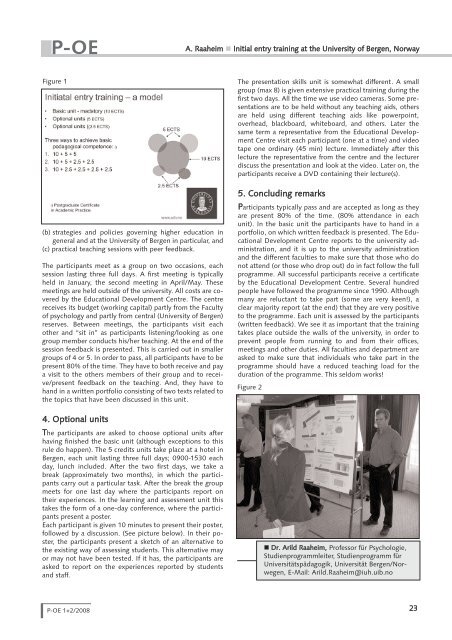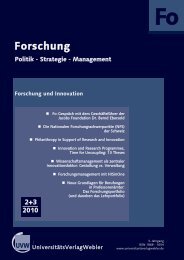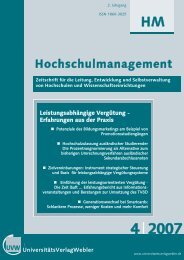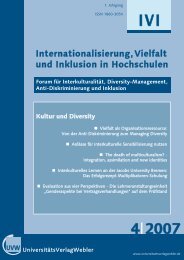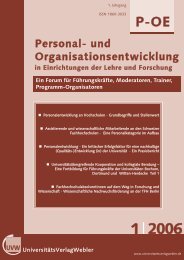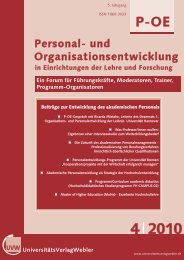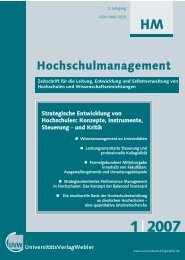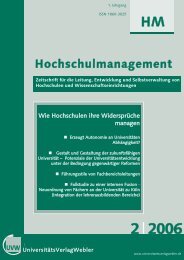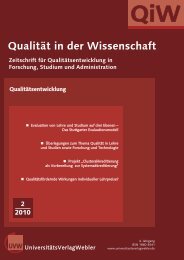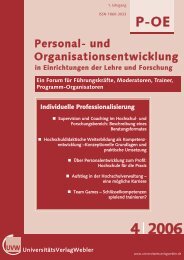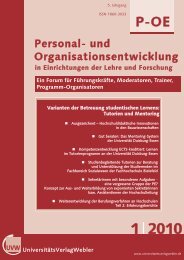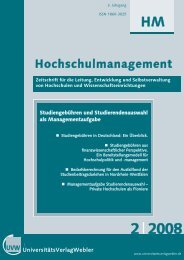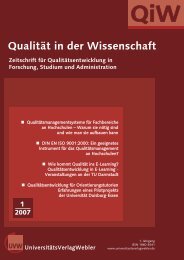P-OE - UniversitätsVerlagWebler
P-OE - UniversitätsVerlagWebler
P-OE - UniversitätsVerlagWebler
Erfolgreiche ePaper selbst erstellen
Machen Sie aus Ihren PDF Publikationen ein blätterbares Flipbook mit unserer einzigartigen Google optimierten e-Paper Software.
P-<strong>OE</strong><br />
A. Raaheim • Initial entry training at the University of Bergen, Norway<br />
Figure 1<br />
The presentation skills unit is somewhat different. A small<br />
group (max 8) is given extensive practical training during the<br />
first two days. All the time we use video cameras. Some presentations<br />
are to be held without any teaching aids, others<br />
are held using different teaching aids like powerpoint,<br />
overhead, blackboard, whiteboard, and others. Later the<br />
same term a representative from the Educational Development<br />
Centre visit each participant (one at a time) and video<br />
tape one ordinary (45 min) lecture. Immediately after this<br />
lecture the representative from the centre and the lecturer<br />
discuss the presentation and look at the video. Later on, the<br />
participants receive a DVD containing their lecture(s).<br />
(b) strategies and policies governing higher education in<br />
general and at the University of Bergen in particular, and<br />
(c) practical teaching sessions with peer feedback.<br />
The participants meet as a group on two occasions, each<br />
session lasting three full days. A first meeting is typically<br />
held in January, the second meeting in April/May. These<br />
meetings are held outside of the university. All costs are covered<br />
by the Educational Development Centre. The centre<br />
receives its budget (working capital) partly from the Faculty<br />
of psychology and partly from central (University of Bergen)<br />
reserves. Between meetings, the participants visit each<br />
other and “sit in” as participants listening/looking as one<br />
group member conducts his/her teaching. At the end of the<br />
session feedback is presented. This is carried out in smaller<br />
groups of 4 or 5. In order to pass, all participants have to be<br />
present 80% of the time. They have to both receive and pay<br />
a visit to the others members of their group and to receive/present<br />
feedback on the teaching. And, they have to<br />
hand in a written portfolio consisting of two texts related to<br />
the topics that have been discussed in this unit.<br />
4. Optional units<br />
The participants are asked to choose optional units after<br />
having finished the basic unit (although exceptions to this<br />
rule do happen). The 5 credits units take place at a hotel in<br />
Bergen, each unit lasting three full days; 0900-1530 each<br />
day, lunch included. After the two first days, we take a<br />
break (approximately two months), in which the participants<br />
carry out a particular task. After the break the group<br />
meets for one last day where the participants report on<br />
their experiences. In the learning and assessment unit this<br />
takes the form of a one-day conference, where the participants<br />
present a poster.<br />
Each participant is given 10 minutes to present their poster,<br />
followed by a discussion. (See picture below). In their poster,<br />
the participants present a sketch of an alternative to<br />
the existing way of assessing students. This alternative may<br />
or may not have been tested. If it has, the participants are<br />
asked to report on the experiences reported by students<br />
and staff.<br />
5. Concluding remarks<br />
Participants typically pass and are accepted as long as they<br />
are present 80% of the time. (80% attendance in each<br />
unit). In the basic unit the participants have to hand in a<br />
portfolio, on which written feedback is presented. The Educational<br />
Development Centre reports to the university administration,<br />
and it is up to the university administration<br />
and the different faculties to make sure that those who do<br />
not attend (or those who drop out) do in fact follow the full<br />
programme. All successful participants receive a certificate<br />
by the Educational Development Centre. Several hundred<br />
people have followed the programme since 1990. Although<br />
many are reluctant to take part (some are very keen!), a<br />
clear majority report (at the end) that they are very positive<br />
to the programme. Each unit is assessed by the participants<br />
(written feedback). We see it as important that the training<br />
takes place outside the walls of the university, in order to<br />
prevent people from running to and from their offices,<br />
meetings and other duties. All faculties and department are<br />
asked to make sure that individuals who take part in the<br />
programme should have a reduced teaching load for the<br />
duration of the programme. This seldom works!<br />
Figure 2<br />
• Dr. Arild Raaheim, Professor für Psychologie,<br />
Studienprogrammleiter, Studienprogramm für<br />
Universitätspädagogik, Universität Bergen/Norwegen,<br />
E-Mail: Arild.Raaheim@iuh.uib.no<br />
P-<strong>OE</strong> 1+2/2008<br />
23


